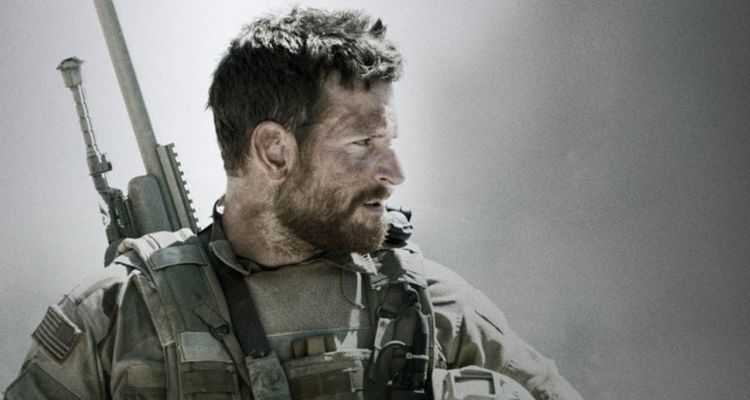 (3.5 / 5)
(3.5 / 5)
For an Academy Award Best Picture nominee, American Sniper is not without its problems.
Its 84-year-old director Clint Eastwood is known for being a slightly hawkish libertarian with a penchant for shouting at empty chairs (“penchant” might be overstating, but, as they say, “You f**k one sheep…”). As such, his take on the personal and wartime experiences of Navy SEAL Chris Kyle, the most lethal sniper in US military history, was always going to have its detractors.
From its hard-hitting opening sequence of Kyle taking a bead on an Iraqi mother and child — she happens to be nursing an RKG Russian grenade — to its tragic homestead conclusion, American Sniper focuses on the story of its eponymous hero at the expense of the bigger picture.
This is not war film like Eastwood’s Flags of Our Fathers or Letters From Iwo Jima, seeking to ground everything in its proper context, but rather a biopic of a controversial figure who, depending on your viewpoint, was either a self-sacrificing hero or a self-righteous murderer. One of the film’s most notable flaws is that it never addresses any notion of the latter.
Kyle, as portrayed by Oscar nominee Bradley Cooper, is certainly a heroic figure: a charming, baby-faced Texan, pick-up driving ranch hand and aspiring cowboy, he enlists without a thought after witnessing the 1998 embassy bombings on TV. The film quickly establishes, through flashback, the moral code instilled in Chris by his stern yet loving father. A born protector, complications ensue when he falls in love with the tough, cool Taya (a remarkably natural Sienna Miller). Their wedding takes place aboard a navy vessel and Chris learns he’s shipping out during the reception.
Jason Hall’s script is commendable for its balancing of the two worlds that Chris must occupy. One — Iraq — is defined by rubble, doorways, and dust, picked out in khaki, grey, and beige. He banters and jokes with his fellow SEALs, most notably the joking “Biggles” (Jake McDorman), and watches them from above, picking off insurgents like a militaristic guardian angel.
Iraq is full of larger-than-life monsters, like the drill-wielding Butcher (Mido Hamada) and black-hat enemy sniper Mustafa (Sammy Sheik), with whom Chris duels across rooftops. There’s no room for subtlety in this blasted city-scape — only moment by moment choices.
The America Kyle leaves behind, meanwhile, includes a pregnant wife whose TV screens declares numbers of military dead as a cot sits in pieces before her. The message, an undeniably traditionalist one, is clear: Chris should be there. Nevertheless, in fulfilling his role as “Legend”, the sheepdog, watching over his fellow soldiers, Chris undoubtedly saves lives.
American Sniper presents the Iraqi civilians as he must see them, as pleading victims or unwilling collaborators with weapons caches hidden in their kitchens. Chris’ understanding of this as simply Evil — “Evil like I’ve never seen before” — was certainly true for him.
When Chris returns home, for instance, he’s not the jovial, self-aware grunt we saw chatting up Taya in a bar, holding her hair back as she vomited. He’s distracted and defensive; according to his long-suffering wife even his hands feel different. His condition is drawn into sharp relief as we observe him sat in front of the TV accompanied by shouts, explosions, and gunfire, all the noises of war, only for the camera to pan around and reveal the screen is blank: he is alone. Even the colors Stateside are too vivid, too intimate.
Despite the film’s sensitive rendering of PTSD and the disabled vets who Chris helps return to normal life, as they do for him, Eastwood keeps us ever so slightly removed from the action. His camera pops up over window frames along with the troops and follows them into the chaos of a firefight, but feels more at home when observing through Chris’ sniper scope.
Less immersive than, say, Saving Private Ryan, we observe rather than undergo what Chris does, though a sequence set amidst the reddish confusion of a sandstorm serves, perhaps, as an unintended allegory for the whole Iraq conflict — the rifle abandoned amidst the desert sand.
American Sniper may claim to be antiwar in its consideration of the cost, but ultimately, in battling the sorts of monsters who keep human body parts in a walk-in fridge, it concludes war to be a necessary evil (as opposed to the aforementioned Evil).
A surprisingly subtle polemic, we’re more inclined to remember the muscular, taciturn Cooper, from smirking to haunted, and the rock steady Miller, making the most of a few key scenes, than the swarms of indistinguishable insurgents appearing as in a video game. The film simply has no occasion to see them as anything else.
Notorious plastic babies notwithstanding, this is a genuine human story, but sadly not a far-sighted one.
